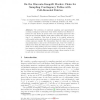Free Online Productivity Tools
i2Speak
i2Symbol
i2OCR
iTex2Img
iWeb2Print
iWeb2Shot
i2Type
iPdf2Split
iPdf2Merge
i2Bopomofo
i2Arabic
i2Style
i2Image
i2PDF
iLatex2Rtf
Sci2ools
COCOON
2009
Springer
2009
Springer
On the Diaconis-Gangolli Markov Chain for Sampling Contingency Tables with Cell-Bounded Entries
The problems of uniformly sampling and approximately counting contingency tables have been widely studied, but efficient solutions are only known in special cases. One appealing approach is the Diaconis and Gangolli Markov chain which updates the entries of a random 2 × 2 submatrix. This chain is known to be rapidly mixing for cell-bounded tables only when the cell bounds are all 1 and the row and column sums are regular. We demonstrate that the chain can require exponential time to mix in the cell-bounded case, even if we restrict to instances for which the state space is connected. Moreover, we show the chain can be slowly mixing even if we restrict to natural classes of problem instances, including regular instances with cell bounds of either 0 or 1 everywhere, and dense instances where at least a linear number of cells in each row or column have non-zero cell-bounds.
| Added | 26 May 2010 |
| Updated | 26 May 2010 |
| Type | Conference |
| Year | 2009 |
| Where | COCOON |
| Authors | Ivona Bezáková, Nayantara Bhatnagar, Dana Randall |
Comments (0)

